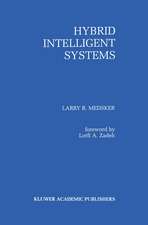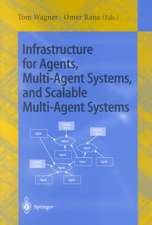Advances in Artificial Intelligence: 16th Brazilian Symposium on Artificial Intelligence, SBIA 2002, Porto de Galinhas/Recife, Brazil, November 11-14, 2002, Proceedings: Lecture Notes in Computer Science, cartea 2507
Editat de Guilherme Bittencourt, Geber L. Ramalhoen Limba Engleză Paperback – 28 oct 2002
Din seria Lecture Notes in Computer Science
- 20%
 Preț: 1061.55 lei
Preț: 1061.55 lei - 20%
 Preț: 307.71 lei
Preț: 307.71 lei - 20%
 Preț: 438.69 lei
Preț: 438.69 lei - 20%
 Preț: 645.28 lei
Preț: 645.28 lei -
 Preț: 410.88 lei
Preț: 410.88 lei - 15%
 Preț: 580.46 lei
Preț: 580.46 lei - 17%
 Preț: 427.22 lei
Preț: 427.22 lei - 20%
 Preț: 596.46 lei
Preț: 596.46 lei -
 Preț: 449.57 lei
Preț: 449.57 lei - 20%
 Preț: 353.50 lei
Preț: 353.50 lei - 20%
 Preț: 1414.79 lei
Preț: 1414.79 lei - 20%
 Preț: 309.90 lei
Preț: 309.90 lei - 20%
 Preț: 583.40 lei
Preț: 583.40 lei - 20%
 Preț: 1075.26 lei
Preț: 1075.26 lei - 20%
 Preț: 310.26 lei
Preț: 310.26 lei - 20%
 Preț: 655.02 lei
Preț: 655.02 lei - 20%
 Preț: 580.93 lei
Preț: 580.93 lei - 20%
 Preț: 340.32 lei
Preț: 340.32 lei - 18%
 Preț: 938.83 lei
Preț: 938.83 lei - 20%
 Preț: 591.51 lei
Preț: 591.51 lei - 15%
 Preț: 438.59 lei
Preț: 438.59 lei - 20%
 Preț: 337.00 lei
Preț: 337.00 lei -
 Preț: 389.48 lei
Preț: 389.48 lei - 20%
 Preț: 607.39 lei
Preț: 607.39 lei - 20%
 Preț: 1024.44 lei
Preț: 1024.44 lei - 20%
 Preț: 579.30 lei
Preț: 579.30 lei - 20%
 Preț: 763.23 lei
Preț: 763.23 lei - 20%
 Preț: 453.32 lei
Preț: 453.32 lei - 20%
 Preț: 575.48 lei
Preț: 575.48 lei - 20%
 Preț: 585.88 lei
Preț: 585.88 lei - 20%
 Preț: 825.93 lei
Preț: 825.93 lei - 20%
 Preț: 763.23 lei
Preț: 763.23 lei - 17%
 Preț: 360.19 lei
Preț: 360.19 lei - 20%
 Preț: 1183.14 lei
Preț: 1183.14 lei - 20%
 Preț: 340.32 lei
Preț: 340.32 lei - 20%
 Preț: 504.57 lei
Preț: 504.57 lei - 20%
 Preț: 369.12 lei
Preț: 369.12 lei - 20%
 Preț: 583.40 lei
Preț: 583.40 lei - 20%
 Preț: 343.62 lei
Preț: 343.62 lei - 20%
 Preț: 350.21 lei
Preț: 350.21 lei - 20%
 Preț: 764.89 lei
Preț: 764.89 lei - 20%
 Preț: 583.40 lei
Preț: 583.40 lei - 20%
 Preț: 649.49 lei
Preț: 649.49 lei - 20%
 Preț: 341.95 lei
Preț: 341.95 lei - 20%
 Preț: 238.01 lei
Preț: 238.01 lei - 20%
 Preț: 538.29 lei
Preț: 538.29 lei
Preț: 340.32 lei
Preț vechi: 425.40 lei
-20% Nou
Puncte Express: 510
Preț estimativ în valută:
65.12€ • 68.17$ • 53.88£
65.12€ • 68.17$ • 53.88£
Carte tipărită la comandă
Livrare economică 05-19 aprilie
Preluare comenzi: 021 569.72.76
Specificații
ISBN-13: 9783540001249
ISBN-10: 3540001247
Pagini: 436
Ilustrații: XIV, 422 p.
Dimensiuni: 155 x 235 x 23 mm
Greutate: 0.64 kg
Ediția:2002
Editura: Springer Berlin, Heidelberg
Colecția Springer
Seriile Lecture Notes in Computer Science, Lecture Notes in Artificial Intelligence
Locul publicării:Berlin, Heidelberg, Germany
ISBN-10: 3540001247
Pagini: 436
Ilustrații: XIV, 422 p.
Dimensiuni: 155 x 235 x 23 mm
Greutate: 0.64 kg
Ediția:2002
Editura: Springer Berlin, Heidelberg
Colecția Springer
Seriile Lecture Notes in Computer Science, Lecture Notes in Artificial Intelligence
Locul publicării:Berlin, Heidelberg, Germany
Public țintă
ResearchCuprins
Theoretical and Logical Methods.- On Special Functions and Theorem Proving in Logics for ‘Generally’.- First-Order Contextual Reasoning.- Logics for Approximate Reasoning: Approximating Classical Logic “From Above”.- Attacking the Complexity of Prioritized Inference Preliminary Report.- A New Approach to the Identification Problem.- Towards Default Reasoning through MAX-SAT.- Autonomous Agents and Multi-agent Systems.- Multiple Society Organisations and Social Opacity: When Agents Play the Role of Observers.- Altruistic Agents in Dynamic Games.- Towards a Methodology for Experiments with Autonomous Agents.- How Planning Becomes Improvisation? — A Constraint Based Approach for Director Agents in Improvisational Systems.- Extending the Computational Study of Social Norms with a Systematic Model of Emotions.- A Model for the Structural, Functional, and Deontic Specification of Organizations in Multiagent Systems.- The Queen Robots: Behaviour-Based Situated Robots Solving the N-Queens Puzzle.- The Conception of Agents as Part of a Social Model of Distance Learning.- Emotional Valence-Based Mechanisms and Agent Personality.- Simplifying Mobile Agent Development through Reactive Mobility by Failure.- Dynamic Social Knowledge: The Timing Evidence.- Machine Learning.- Empirical Studies of Neighborhood Shapes in the Massively Parallel Diffusion Model.- Ant-ViBRA: A Swarm Intelligence Approach to Learn Task Coordination.- Automatic Text Summarization Using a Machine Learning Approach.- Towards a Theory Revision Approach for the Vertical Fragmentation of Object Oriented Databases.- Speeding up Recommender Systems with Meta-prototypes.- ActiveCP: A Method for Speeding up User Preferences Acquisition in Collaborative Filtering Systems.- Making Recommendations for GroupsUsing Collaborative Filtering and Fuzzy Majority.- Knowledge Discovery and Data Mining.- Mining Comprehensible Rules from Data with an Ant Colony Algorithm.- Learning in Fuzzy Boolean Networks — Rule Distinguishing Power.- Attribute Selection with a Multi-objective Genetic Algorithm.- Applying the Process of Knowledge Discovery in Databases to Identify Analysis Patterns for Reuse in Geographic Database Design.- Lithology Recognition by Neural Network Ensembles.- Evolutionary Computation and Artificial Life.- 2-Opt Population Training for Minimization of Open Stack Problem.- Grammar-Guided Genetic Programming and Automatically Defined Functions.- An Evolutionary Behavior Tool for Reactive Multi-agent Systems.- Controlling the Population Size in Genetic Programming.- Uncertainty.- The Correspondence Problem under an Uncertainty Reasoning Approach.- Random Generation of Bayesian Networks.- Evidence Propagation in Credal Networks: An Exact Algorithm Based on Separately Specified Sets of Probability.- Restoring Consistency in Systems of Fuzzy Gradual Rules Using Similarity Relations.- Natural Language Processing.- Syntactic Analysis for Ellipsis Handling in Coordinated Clauses.- Assessment of Selection Restrictions Acquisition.
Caracteristici
Includes supplementary material: sn.pub/extras
















